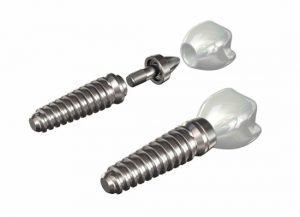Peri-Implantitis And Your Dental Implants
Epsom dentist Dr Andrew Murphy, looks at this less well known threat to replacement teeth
 If you are a regular reader of our blogs, you will have previously come across the term ‘periodontitis’. This is the advanced stage of gum disease which can cause teeth to become loose and even fall out. Fewer of you may have come across the term ‘peri-implantitis’ however and this may be because it only affects those patients who have had dental implants placed.
If you are a regular reader of our blogs, you will have previously come across the term ‘periodontitis’. This is the advanced stage of gum disease which can cause teeth to become loose and even fall out. Fewer of you may have come across the term ‘peri-implantitis’ however and this may be because it only affects those patients who have had dental implants placed.
With this becoming an increasingly popular tooth replacement option though, it is important that patients of the Clock Tower Dental Clinic are aware of this potential threat and understand how to help prevent it, should they ever have implants placed.
With advances in dental technology and the quality of the implants themselves, implant failure is very rare indeed, providing that the correct care is taken. Unfortunately, where this does not happen, peri-implantitis is a potential consequence.
What is peri-implantitis?
In effect, this is relatively similar to periodontitis and has similar causes; i.e. poor oral health. If we have dental implants and don’t look after them correctly, with regular brushing and flossing, as well as professional monitoring and cleaning, peri-implantitis is a possible outcome.
It is important for patients to remember that although the implant is made from an artificial material, it is essential that it is kept clean and not neglected. The implant itself won’t deteriorate but the tissue surrounding it can. As these tissues deteriorate, they are less able to support the implant that has been placed into the jawbone. This will then start to become loose and, like a tooth root, can even come out.
Peri-implantitis tends to happen in two stages:
Peri-implant mucositis
This is a similar stage to gingivitis and occurs in the earlier stages. At this point, the bone is unlikely to be affected but the gums can become sore and inflamed. Although this does not pose an immediate threat to the implant, it is likely to cause some discomfort and should certainly be taken as a warning sign of further damage and you should seek advice from one of our experienced Epsom dental team. At this stage, the problem is more likely to be managed with relatively straightforward, enhanced cleaning.
Peri-implantitis
At this point in the disease, it is not only the soft tissues of the gum that become infected but also the bone tissue that is supporting your teeth implants. As this deteriorates, the implant may become loose and the risk of implant failure is more significant. A dental hygienist cleaning is unlikely to reverse this problem and surgical intervention may be necessary to try to save the implant.
Should this deter me from having implants?
The simple answer to this question is a definite ‘no’. As mentioned earlier, the success rate of dental implants is very high indeed. Providing that you have them placed by a suitably qualified and experienced implant dentist, there is no reason why they shouldn’t be a great success for you, providing you with a strong and secure tooth replacement that lasts for many years.
The vast majority of implant problems are caused by a failure to keep them sufficiently clean. This is not hard to do and you should treat them as you would your natural teeth. A good daily cleaning and flossing regime is essential and we strongly recommend that you see our hygienist for a professional clean approximately every 6 months. This should be sufficient to keep your implant healthy but if you do experience any problems at all, you should always contact us as soon as possible and not allow the issue to worsen. Early intervention will bring the best results.
For those patients who may be at a higher risk of gum disease; e.g. diabetics; implants are still a possibility but may require more frequent professional cleaning. We are happy to discuss this with you in detail and offer our advice. Should you feel that implants are not for you, for any reason, we are happy to advise on the alternatives available.
If you are at all concerned about the risks of peri-implantitis and feel that this may deter you from having implants placed, it is worth remembering that the vast majority of people have successful treatment which lasts for 20 or more years with little intervention, other than that which would normally occur with your natural teeth. That said, we do understand that some people may have questions about this or other aspects of dental implants. Accordingly, we offer a free initial consultation to enable you to ask us questions as well as to allow us to assess your suitability for this particular treatment.
To arrange a consultation at the Clock Tower Dental Clinic please call through to our friendly team on 01372 720136.
